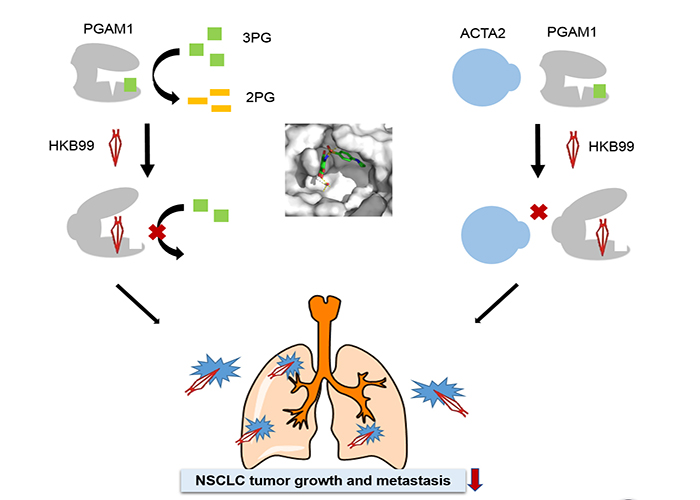
Recently, Lu Zhou's lab from School of Pharmacy, Fudan University, has published a paper entitled "A novel allosteric inhibitor of phosphoglycerate mutase 1 suppresses growth and metastasis of non-small cell lung cancer" in Cell Metabolism (impact factor 22.415), collaborated with Ying Shen's group from Shanghai Jiaotong University School of Medicine, and Hongzhuan Chen's group from Shanghai University of Traditional Chinese Medicine.
Phosphoglycerate mutase 1 (PGAM1) catalyzes the conversion of 3-phosphoglycerate (3-PG) to 2-phosphoglycerate (2-PG) to promote glucose metabolism and energy generation. It regulates metabolic pathways involved in macromolecules synthesis and redox homeostasis by controlling the balance of 3-PG and 2-PG, to promote proliferation and metastasis of tumor cells. Studies have shown that PGAM1 is commonly overexpressed in a variety of malignancies, including non-small cell lung cancer, and associated with poor prognosis. Therefore, PGAM1 is thought to be an anti-cancer metabolism target for drug development.
The researchers in Lu Zhou’s lab developed a new PGAM1 allosteric inhibitor (named HKB99) through structure-based drug design and optimization, with the advantages of high selectivity, high activity, and low toxicity. Data showed that HKB99 blocks the synthesis of intracellular macromolecules and disrupts redox homeostasis by inhibiting the conversion of 3-PG to 2-PG. As a result, HKB99 inhibited the growth of non-small cell lung cancer and erlotinib-resistant lung cancer cells. In addition, HKB99 inhibited the metastasis of non-small cell lung cancer cells by disrupting the interaction of PGAM1 and ACTA2 (Figure 1). This further confirmed that PGAM1 is a potential drug target for lung cancer treatment. It provides a prove-of-concept strategy for the development of antitumor drug with a brand new mode of action.

Ke Huang, a Ph.D. student from Fudan University School of Pharmacy, Qian Liang and Yan Zhou, Ph.D. students from Shanghai Jiao Tong University School of Medicine, are co-first authors. Associate professor Ying Shen, associate professor Lu Zhou and professor Hongzhuan Chen are the co-corresponding authors of the paper. Researchers from multiple organizations participated in the study, including School of Pharmacy of Fudan University, Shanghai Center for Translational Medicine Collaborative Innovation, Shanghai Institute of Materia Medica, Chinese Academy of Sciences, National Key Laboratory of Oncogenes and Related Genes, Key Laboratory of Apoptosis and Differentiation of the Ministry of Education, Department of Chemistry of University of Chicago. The research was supported by the National Natural Science Foundation of China, the Shanghai Science and Technology Committee, and the Shanghai Education Committee.
Full text: https://doi.org/10.1016/j.cmet.2019.09.014